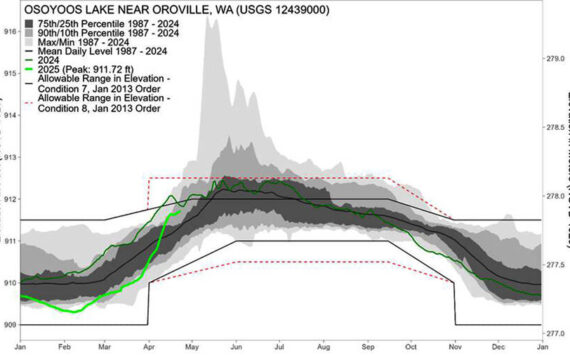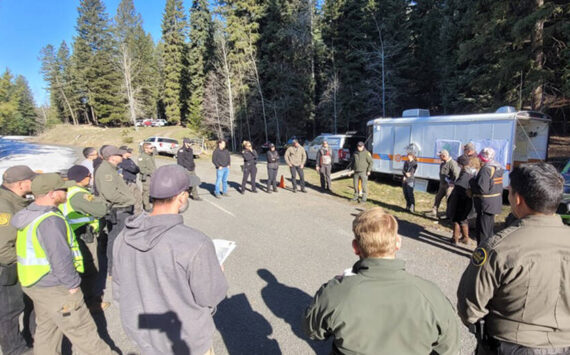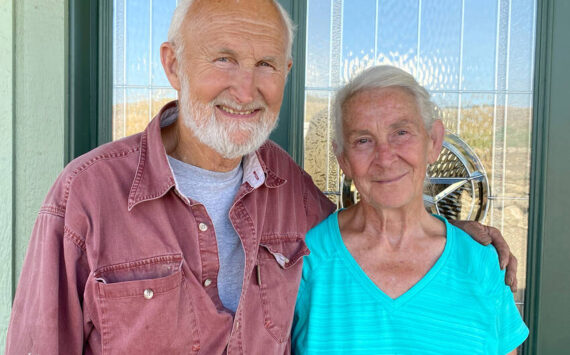OROVILLE – David Boyd told Oroville Chamber of Commerce members that they may be eligible for grants and utility incentives to replace old equipment, reduce energy costs and even generate power on-site.
Boyd is working with Washington State University helping small business owners and agriculture producers through a public/private partnership to write REAP (Rural Energy for America Program) grants through the state Department of Commerce. The project is funded by the U.S. Department of Agriculture.
“For example if you have a restaurant and you need a new cooler because it is leaking, then we would fund 25 percent of the project,” said Boyd. “There are a lot of funding sources out there that can really shrink the cost of doing a project. If you’re having problems finding these sources we’ll help you.”
Boyd said the projects must be at least $6000 and use existing and proven off-the-shelf technology. Someone from Rural Energy Development for Washington will visit the site to determine if the project will benefit from a grant. The program can also help on a one-to-one basis to discover what federal, state or local help is available for the project, according to Boyd.
He gave an example of one business that replaced older florescent lighting with new, more energy efficient models and saved the business $5000 a year in energy costs.
“The local PUD paid half the cost, if she went for a REAP grant it could have saved her an additional 25 percent. The business owner used her yearly savings and a grant to buy a solar array which helped to generate about $10,000 a year and shrunk payback on the project to three years,” he said.
He was also cautionary about making sure energy producing projects fit the area, describing one instance where a homeowner decided to put up a wind turbine without doing the proper research. The homeowner’s project cost over $50,000.
“He thought he would power his whole house and there wasn’t enough power generated to even pay for itself. In this area, something like solar would work well because of all the sunshine you get, especially considering Germany is now the largest solar producer and they do not get nearly the sunshine you do here,” Boyd said.
Boyd added the reasons for doing projects aren’t just because saving energy is the latest thing, but that it can save money for small businesses and farms leading to bigger profits.
Jim Newton, owner of FB’s Family Diner where last Thursday’s chamber meeting took place, said he was looking into using used fry oil as a source of heating fuel. Boyd said that part of the project might be fundable if it used existing technology and that he should contact him to discuss the project further.
Boyd distributed a handout from the state Department of Commerce titled “Get Paid to Save Money!” It said that the Rural Energy Development for Washington Program’s Sustainable Energy for Economic Development can help if:
You are a small business or agricultural producer.
You’d like to do a renewable energy or efficiency project.
You want to invest in on-site power generation to increase your profitability.
You need to upgrade your heating, cooling or lighting.
You have old or broken equipment that needs replacing.
You need a set of expert eyes to help you figure out how to make your project work.
Debbie Peters, one of the energy services coordinators with Okanogan County PUD also was on hand to discuss programs the local utility offers. She said the PUD partners with other organizations like the Okanogan County Conservation Service to help to fund projects, especially with farmers. She told the chamber the PUD had an interest free loan program for up to $25,000 for energy saving projects that only required monthly payments and a small administration fee.
“There are a variety of programs we are involved in. We participate with the BPA, we can also run custom projects by the BPA. We partner with Conservation to do irrigation and agricultural projects,” Peters said.
Kirstin Cook with the Okanogan County Conservation Service said that technically the service is a branch of local government, but is non-regulatory.
“We do things like fund new nozzles, fix pipes, new gearing. Most of our programs are focused on landowners and livestock,” said Cook.
More information on the REAP Grants can be found at www.nwseed.org/ruralrenewables.asp where there is a webinar. Boyd can be contacted at (360) 725-5038 or at david.boyd@commerce.wa.gov.






